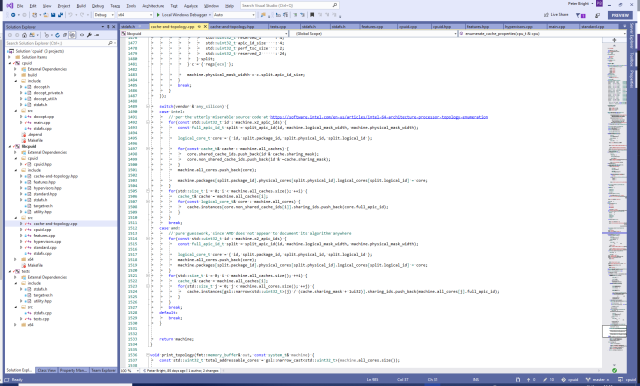Microsoft today made a number of developer-oriented announcements that continue its theme of the last few years: the company wants its tools—and ultimately its platforms, especially Azure—to be the choice of every developer, no matter which languages and tools they use and no matter what platform they ultimately deploy on.
The centerpiece of Microsoft's developer tools remains Visual Studio, and a first preview of its 2019 edition is now available to download. It integrates the awesome Live Share feature first demonstrated last year and expands IntelliCode, a machine-learning-driven extension to the IntelliSense developer assistance that's been a part of Visual Studio for ages. IntelliCode examines source code repositories to build models of a range of different things, from code formatting preferences to library usage and development patterns.
Currently, IntelliCode works with C# in Visual Studio and Python in Visual Studio Code. It does so by using GitHub's open source repositories as its training data. Visual Studio 2019 expands this to enable analysis of private repositories. It also increases the language compatibility; Visual Studio will add C++ and XAML support, while Visual Studio Code will pick up JavaScript, TypeScript, and Java support.
A preview of Visual Studio 2019 for Mac is also available.
Open source and cross platform
On the .NET front, .NET Core 2.2—the open source .NET platform that spans Windows, macOS, and Linux—is now generally available. Perhaps more significant, however, is the first preview of .NET Core 3.0, which will include support for both the WinForms and Windows Presentation Foundation (WPF) graphical interface frameworks. This in turn means that, for the first time, Microsoft will be open sourcing those frameworks. WinForms will be available immediately; WPF will be opened up in phases over the coming weeks. Both of these toolkits are now under the stewardship and control of the .NET Foundation. Also being opened up is WinUI, a set of controls for writing UWP applications.
The .NET Foundation is also changing its membership model to increase the representation of open source contributors. The board is being expanded from three to seven members, and anybody who has contributed to the .NET Foundation's open source development is eligible to be elected. Individual open source contributors are also eligible to join the Foundation as members.

On top of this, a bunch of Azure services have been updated. A range of machine-learning and cognitive services have been updated to both expand the capabilities within the cloud and increase the number of machine-learning tasks that can be pushed to edge devices.
Azure DevOps, the set of componentized application lifecycle management services, is also seeing new features: Azure Boards, which provides dashboards and reporting for projects, now integrates with GitHub Issues. Azure Pipelines, the build/test/deploy service, now has a Visual Studio extension to make designing workflows easier.
Microsoft is also rolling out new options for serverless applications and containerized applications. There's a preview of Kubernetes cluster scaling, a preview of GPU-accelerated containers, and a preview version of a Linux-hosted version of Azure Functions, which provides the same pay-per-execution model as the current non-Linux Azure Functions service. Python can now also be used to write Functions—er, functions—in a new public preview.
[contf] [contfnew] 
Ars Technica
[contfnewc] [contfnewc]







